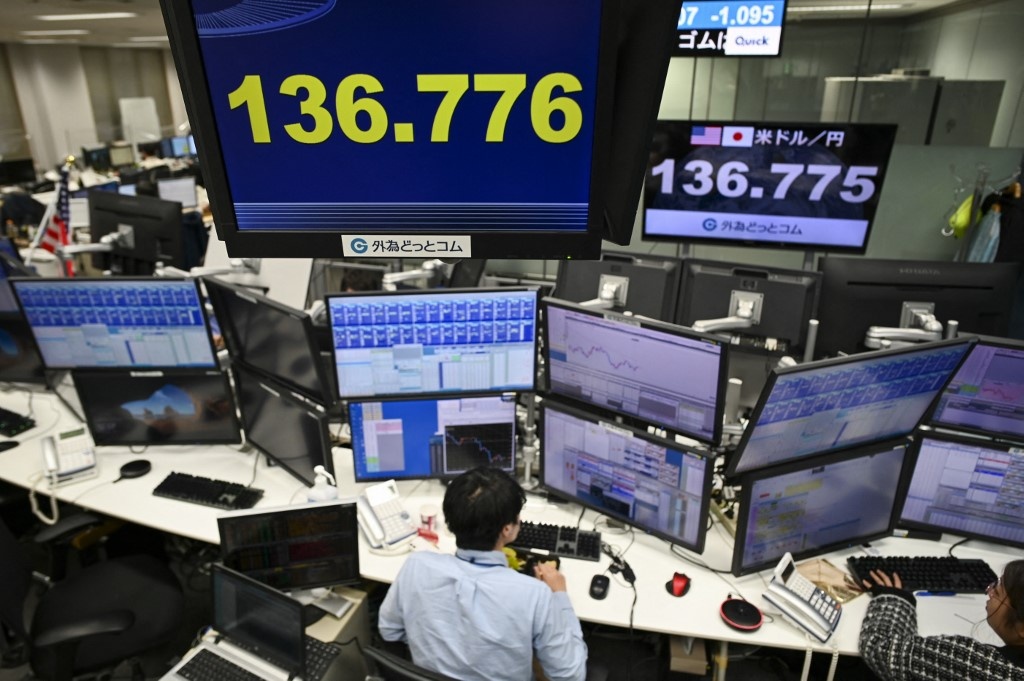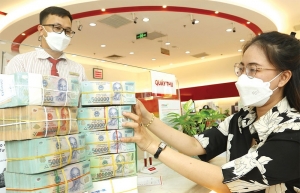INTERNATIONAL INVESTMENT
AND PORTAL
The dollar struggled to recover on Friday from its recent sell-off as traders grew confident the Federal Reserve will slow its pace of interest rate hikes, while an equities rally sputtered ahead of key US jobs data.
Another positive inflation data release out of the United States added to expectations that the US central bank will take a lighter approach to lifting borrowing costs at its December meeting.
 Fed rate hopes weigh on dollar, stocks fall ahead of US jobs data, Kazuhiro NOGI / AFP
Fed rate hopes weigh on dollar, stocks fall ahead of US jobs data, Kazuhiro NOGI / AFP
The personal consumption expenditures price index data came a day after Fed boss Jerome Powell indicated that the days of 75 percentage-point rate increases were gone as officials pore over the impact of tightening on the economy.
A report showing factory activity shrinking in November added to the sense that the Fed moves were kicking in.
The developments gave forex traders another reason to shift out of the dollar, pushing it down against its major peers -- having surged this year on the back of hawkish Fed policy.
The greenback was under particular pressure from the yen Thursday, having hit a three-decade high in October, while sterling and the yuan were also well up from the record lows touched recently.
The US unit was unable to break higher on Friday.
However, several Fed officials including Powell have lined up to warn that rates will continue to rise and stay elevated, with the possibility of no cut until 2024.
While the mood on trading floors has become much lighter, equity investors took a step back from their latest buying spree as they awaited the release of the closely watched non-farm payrolls report later Friday.
The figures will provide the most recent snapshot of how the world's top economy is faring in light of the higher rates and four-decade-high inflation.
"Stocks are grinding a touch lower in Asia after a directionless US session, which sees local traders book some profits ahead of the non-farm payroll report," said SPI Asset Management's Stephen Innes.
"A strong report could still reinforce the Fed's hawkish ambitions. So traders are jockeying for position ahead of the moderately high-risk event."
Tokyo, Sydney, Seoul, Singapore, Taipei, Wellington, Manila and Jakarta all fell.
However, Hong Kong and Shanghai were again the standout performers, boosted by hopes that China is edging towards a pivot from its draconian Covid-zero strategy that has locked down tens of millions and strangled the giant economy.
The move came after widespread protests across the country earlier in the week against almost three years of heavy-handed containment measures and calls for more political freedoms, which have rattled the leadership of Xi Jinping.
- Key figures around 0230 GMT -
Tokyo - Nikkei 225: DOWN 1.9 percent at 27,679.84 (break)
Hong Kong - Hang Seng Index: UP 0.5 percent at 18,822.49
Shanghai - Composite: UP 0.1 percent at 3,167.57
Euro/dollar: DOWN at $1.0514 from $1.0529 on Thursday
Dollar/yen: DOWN at 135.10 yen from 135.34 yen
Pound/dollar: DOWN at $1.2240 from $1.2251
Euro/pound: DOWN at 85.90 pence from 85.91 pence
West Texas Intermediate: UP 0.2 percent at $81.39 per barrel
Brent North Sea crude: UP 0.3 percent at $87.12 per barrel
New York - Dow: DOWN 0.6 percent at 34,395.01 (close)
London - FTSE 100: DOWN 0.2 percent at 7,558.49 (close)
 Keeping monetary stability-core task in face of FED interest rate hikes
Keeping monetary stability-core task in face of FED interest rate hikes
Amid the US Federal Reserve (FED)’s continuous increases of interest rates to cope with inflation, the most important task for Vietnam now is to keep macro-economic stability, with monetary stability being the core, some economic experts have said.
 Central banks brace after new Fed move
Central banks brace after new Fed move
Central banks across the globe have announced their recent rate hike in a bid to tame inflation, but market watchdogs predict that the tempo of rate rises is starting to slow down.
 Firms urged to keep abreast of alterations by US Fed
Firms urged to keep abreast of alterations by US Fed
Foreign investment flows in Vietnam’s stock market have been impacted by the fourth consecutive interest rate hike by the US Federal Reserve to combat inflation. Businesses in Vietnam are also feeling the strain of expensive USD-denominated loans. Vicente Nguyen, chief investment officer of the Asia Frontier Capital Vietnam Fund, discussed the issue with VIR’s Luu Huong.
By AFP



















